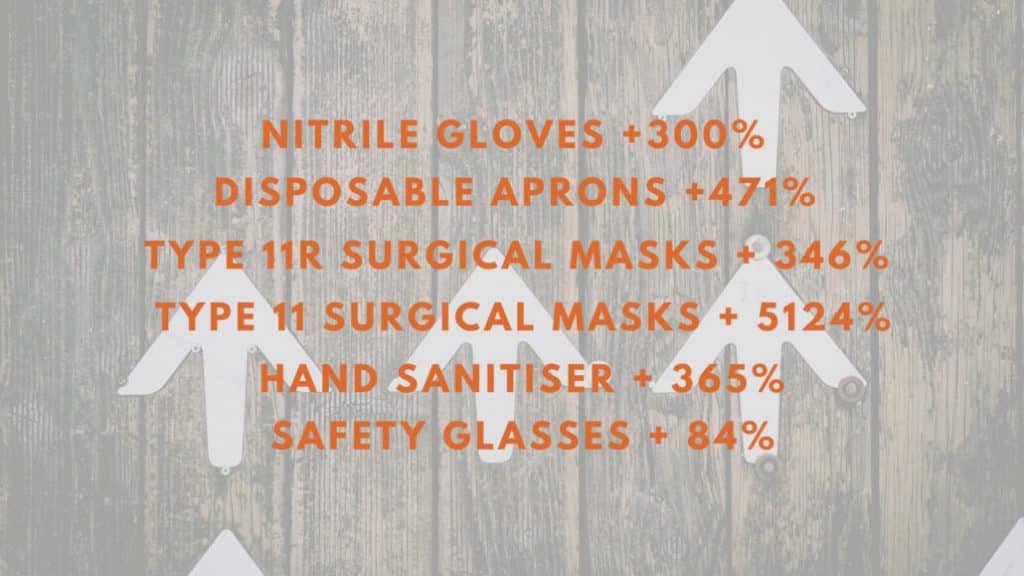PPE procurement has never been so challenging. It has brought out the best and worst in our suppliers and has been the focus of a huge proportion of our team over the last 3 months. We’ve been riding the PPE rollercoaster along with our Care Sector, Housing Association and Charity clients, and we’d like to share what we’ve learned along the way, in the hope that we don’t have to experience a repeat of such a dire situation in the future.
In this article we’ll be addressing the challenges we’ve face on price and availability and share what we’ve learned along the way.
Price
PPE manufacturers and suppliers have taken full advantage of the increased demand in PPE across the healthcare sector. Some of the statistics on price inflation we’ve come across are staggering. Across our Care Sector client buying base the inflation figures on price by category from February to May this year are:

Whilst this is an example of the economics of supply and demand at work, the price hikes are unsustainable. We have also been shocked at some of the practices we have come across in some parts of the supply chain. Thankfully, our experienced team can navigate dealing what one of our team members described as ‘unscrupulous characters’ and we’ve still managed to save money for clients when buying PPE due to economies of scale and our negotiation techniques. But for many care sector businesses this has been a living nightmare. One of our clients, Hestia, said this week that “I feel much more confident we can source what we need now that we are working with you.” The uncertainty and pressure of the last few months expressed in complete relief to have a trusted partner.
It is very clear to anyone that with inflation over 3 months of levels of hundreds if not thousands of percent on PPE pricing, many care sector organisations will rapidly become insolvent. The COVID crisis is not going away, particularly in the Care Sector, so the long-term use of full PPE is a reality set to stay. The government must step in to mitigate this issue with extra funding and support. Scrapping VAT on PPE and the £600 million infection control fund were a step in the right direction but much more needs to be done to both regulate the market and help fund the increase in PPE needs care sector businesses look set to stay with.
Availability
At the beginning of the COVID-19 crisis, the arms race of PPE procurement was like nothing we’ve ever seen. Due to insufficient supply in the UK, all kinds of organisations from both the UK and abroad were crawling out of the woodwork. Our usual suppliers hiked their prices up knowing that they were a reliable source for us and a plethora of low-quality PPE flooded the marketplace.
We are finding now that availability is improving week by week but quality is still an issue. This is leading to some care homes using the practice of ‘double-gloving’. Due to lower quality gloves that tear more easily and employees with higher anxiety levels, twice as many gloves are being used than in fact necessary if the correct quality glove is procured in the first place for example.
The production of domestic production of PPE in the UK has finally been ramped up in recent weeks, yet the reliance on international supply is not healthy, particularly from China.
“We have experienced a whole new level of procurement during COVID-19. The rulebook was thrown out of the window as PPE shortages soared.”
Christoph Marr, MD, Marr Procurement
Lessons Learned & Advice
We have learned a lot during the crisis and can share some of the most relevant issues with you here:
- Buy higher quality and buy once – avoid issues such as double-gloving by buying good quality upfront and providing adequate reassurance and training to staff on the issue.
- Ask certification before you enter negotiations to save time. In our experience many new suppliers who approached us claiming to have stock in the UK already were often not trustworthy sources with no certification or in fact no stock in the UK ready to go.
- We now know which suppliers we trust and can count on – what a short-term view many businesses have taken by not looking after the very organisations that made them the success they are. Once the dust settles, the sector will use the suppliers who behaved the best in a crisis.
- Planning ahead – it is now a great time to crisis plan for a future, similar event. Working out what a reasonable stock-pile looks like in terms of quantities and shelf life could help mitigate future problems should a second spike or different pandemic hit. Holding a healthy level of stock can also mitigate against future price spikes like the one we’ve just experienced.
- Go back to your suppliers now that there is more stock available and renegotiate. You may have to do this weekly until prices drop to healthier levels. Without having the conversation, the price to your business may stay unnecessarily high.
- Budget for increased levels of PPE at higher prices for the foreseeable future. Although the price of face masks for instance is dropping, they’re still not at what we’d call a healthy level.
- Control the supply chain from start to finish if possible. With some clients, we actually delivered the product ourselves to ensure this product arrive in time. Many more agile procurement functions used their own delivery methods to gain ultimate control. This has seen volunteers, taxi drivers, team members or suppliers across other categories getting involved in distributing PPE and therefore ensuring it arrives when needed.
- Make sure you’ve accessed the government’s infection control fund. More details here: https://www.gov.uk/government/publications/adult-social-care-infection-control-fund
- Use forecasting to estimate usage rates and buy ahead of forecast to ensure all of your sites are well provisioned for.
If you’d like to talk to one of our team about PPE, please get in touch for advice. Email ppe@marrprocurement.com

